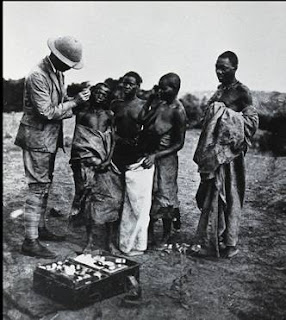Here are the questions for the final exam:
1. How did European colonialism change Africa and African societies? (see especially 10/24 blog post)
2. Since independence, what have been the greatest challenges for African countries? (see especially11/2 blog post)
3. What is the greatest crisis of contemporary Africa? Describe the causes and implications of the crisis of your choice (e.g., AIDS, Islamic fundamentalism, debt, populations growth).
1. How did European colonialism change Africa and African societies? (see especially 10/24 blog post)
2. Since independence, what have been the greatest challenges for African countries? (see especially11/2 blog post)
3. What is the greatest crisis of contemporary Africa? Describe the causes and implications of the crisis of your choice (e.g., AIDS, Islamic fundamentalism, debt, populations growth).














